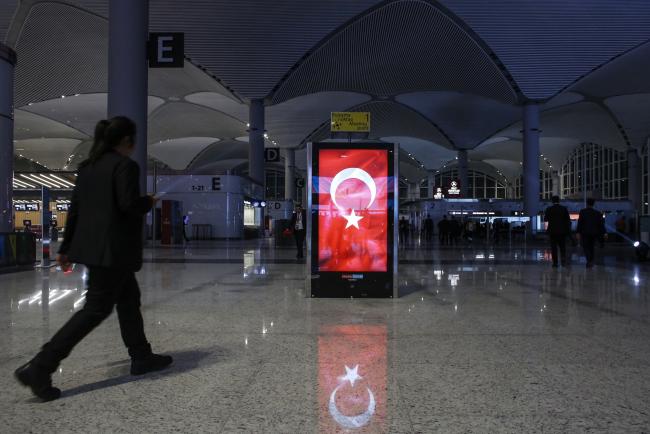(Bloomberg) -- Want the lowdown on European markets? In your inbox before the open, every day. Sign up here.
Investors dumped Turkish bonds and stocks on Wednesday after the nation orchestrated a currency crunch to prevent the lira from sliding days before an election that will test support for President Recep Tayyip Erdogan’s rule.
The cost of borrowing liras overnight on the offshore swap market soared past 1,000 percent at one point on Wednesday because local banks are under pressure not to provide liquidity to foreign fund managers who want to bet against the lira.
This has forced investors who want out of their lira positions to instead sell other Turkish assets to access the currency they need close those trades. The yield two-year Turkish bonds jumped above 20 percent on Wednesday and stocks slid the most since August. Fund managers including Japan’s Daiwa SB Investments Ltd. said they are rethinking investments in the country.
“I’ve never seen a move like this in the 21 years I’ve been watching this market,” said Julian Rimmer, a trader at Investec Bank Plc in London. “This amounts to sacrificing long-term pragmatism for a short-term political expedient. Such tactics will make many traders question the investability of the lira.”
By engineering a situation whereby there isn’t enough lira liquidity for investors to move in and out easily, Turkish authorities have averted a currency slide before a March 31 vote that’ll determine who governs Turkey’s cities. That’s good for Erdogan, who’s already contending with a recession, soaring inflation and opposition parties trying to undermine him. But it comes at the cost inflicting huge pain on the investors he needs to sustain the economy that consistently needs to fund current-account deficits.
While it’s down 2 percent today, the lira has climbed 6 percent so far this week, reversing a slide on Friday that had taken foreign investors by surprise and led many to analysts to recommend selling the currency after months of bullish sentiment.
One of the bearish forecasters was JPMorgan Chase & Co (NYSE:JPM)., which came under fire from Turkish authorities who accused the New York-based lender of giving "misleading" and "manipulative" advice. Erdogan warned on Sunday that bankers deemed responsible for speculating against the currency would be punished.
The threats only increased the resolve of foreign hedge funds to exit the country. But they’ve been unable to execute the trades because Turkish banks are under pressure not to provide liquidity, four bankers with direct knowledge of the transactions said yesterday.
Turkish banks had already faced a limit on how much they can lend to overseas counterparties of 25 percent of their equity, a rule imposed after last summer’s rout to stop foreign investors from trying to flee all at once.
Many analysts and investors contacted by Bloomberg, who declined to go on the record for fear of backlash from Turkish authorities, said that as the lira becomes a very difficult currency to trade, investors may be less inclined to invest in Turkey in the future.
“With the swap moves, I’m now forced to take an unusual strategy,” said Takeshi Yokouchi, an emerging-market fund manager at Daiwa SB who backtracked on a plan to add to his Turkish bond investments because of the constraints in trading. Instead, he’s going to rotate some of his lira holdings into longer-duration bonds or cash.
As an indication of how bad the liquidity crunch is, the cost of borrowing the lira overnight in the offshore market surged more than 40-fold over the last three days to the highest since Turkey’s 2001 financial crisis.
That’s why the lira’s gains this week aren’t offering an relief to investors with long positions; the high foreign-exchange funding rates are likely to wipe out any money they might have made in closing those trades.
Investors soured on the lira after data last week revealed the central bank has drawn down its foreign-exchange reserves in March, leading to speculation it’s trying to prop up the lira before the elections. What’s more, Turkish households and businesses are holding record amounts of their savings into dollars an euros, usually a harbinger of waning confidence in the local currency.
Their selling was also behind the lira’s 2.1 percent decline to 5.4406 per dollar by 4:05 p.m. in Istanbul on Wednesday.
Erdogan, who was sworn in with vast executive powers last June, has been campaigning across the country for the ruling AK Party, which is facing competitive municipal races in the capital of Ankara and the commercial hub of Istanbul this weekend. That poses a threat to its quarter-century-long hold on the two cities.
In the lead up to the vote last year, the lira tumbled as Erdogan threatened to meddle more in monetary policy if he won. A market rout in August led authorities to take steps to prevent similar selloffs from happening again and, up until last week, many foreign investors had piled into Turkish assets to take advantage of the nation’s high interest rates.
